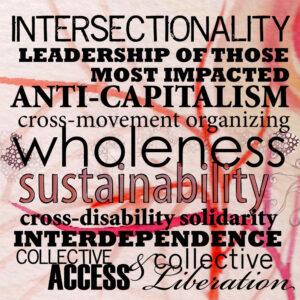Sins Invalid created these principles after meeting in September of 2015. Sins Invalid is a disability justice based performance project that incubates and celebrates artists with disabilities, centralizing artists of color and LGBTQ / gender-variant artists as communities who have been historically marginalized.
10 Principles of Disability Justice:
Patricia Berne, Aurora Levins Morales, David Langstaff, and Sins Invalid
From within Sins Invalid, where we incubate both the framework and practice of Disability Justice, this burgeoning framework has ten (10) principles, each offering new opportunities for movement builders:
- Intersectionality
We know that each person has multiple identities, and that each identity can be a site of privilege or oppression. The mechanical workings of oppression and how they output shift depending upon the characteristics of any given institutional or interpersonal interaction; the very experience of disability itself is being shaped by race, gender, class, gender expression, historical moment, relationship to colonization, and more. - Leadership of Those Most Impacted
We know ableism exists in the context of other historical systemic oppressions. We know to truly have liberation we must be led by those who know the most about these systems and how they work. - Anti-Capitalist Politic
We are anti-capitalist as the very nature of our body/minds resist conforming to a capitalist “normative” level of production. We don’t believe human worth is dependent on what and how much a person can produce. We critique a concept of “labor” as defined by able-bodied supremacy, white supremacy, and gender normativity. We understand capitalism to be a system that promotes private wealth accumulation for some at the expense of others. - Cross-Movement Solidarity
Necessarily cross-movement, Disability Justice shifts how social justice movements understand disability and contextualize ableism, lending itself toward a united front politic. - Recognizing Wholeness
We value our people as they are, for who they are, and understand that people have inherent worth outside of capitalist notions of productivity. Each person is full of history and life experience. Each person has an internal experience composed of their own thoughts, sensations, emotions, fantasies, perceptions, and idiosyncrasies. Disabled people are whole people. - Sustainability
We pace ourselves, individually and collectively, to be sustained long-term. We value the teachings of our lives and bodies. We understand that our embodied experience is a critical guide and reference pointing us toward justice and liberation. - Commitment to Cross-Disability Solidarity
We value and honor the insights and participation of all of our community members. We are committed to breaking down ableist/patriarchal/racist/classed isolation between people with physical impairments, people who identify as “sick” or are chronically ill, “psych” survivors, and those who identify as “crazy,” neurodiverse people, people with cognitive impairments, and people who are of a sensory minority, as we understand that isolation ultimately undermines collective liberation. - Interdependence
Before the massive colonial project of Western European expansion, we understood the nature of interdependence within our communities. We see the liberation of all living systems and the land as integral to the liberation of our own communities, as we all share one planet. We attempt to meet each other’s needs as we build toward liberation, without always reaching for state solutions which can readily extend its control further over our lives. - Collective Access
As brown/black and queer crips, we bring flexibility and creative nuance to engage with each other. We create and explore new ways of doing things that go beyond able-bodied/minded normativity. Access needs aren’t shameful—we all have various capacities which function differently in various environments. Access needs can be articulated within a community and met privately or through a collective, depending upon an individual’s needs, desires, and the capacity of the group. We can share responsibility for our access needs, we can ask that our needs be met without compromising our integrity, we can balance autonomy while being in community, we can be unafraid of our vulnerabilities knowing our strengths are respected. - Collective Liberation
How do we move together as people with mixed abilities, multiracial, multi-gendered, mixed class, across the orientation spectrum—where no body/mind is left behind?
This is Disability Justice, an honoring of the longstanding legacies of resilience and resistance which are the inheritance of all of us whose bodies or minds will not conform. Disability Justice is not yet a broad-based popular movement. Disability Justice is a vision and practice of a movement. Disability Justice is a vision and practice of yet-to-be, a map that we create with our ancestors and our great grandchildren onward, in the width and depth of our multiplicities and histories, a movement towards a world in which every body and mind is known as beautiful
Learn more from Sins Invalid
https://www.sinsinvalid.org/blog/10-principles-of-disability-justice

